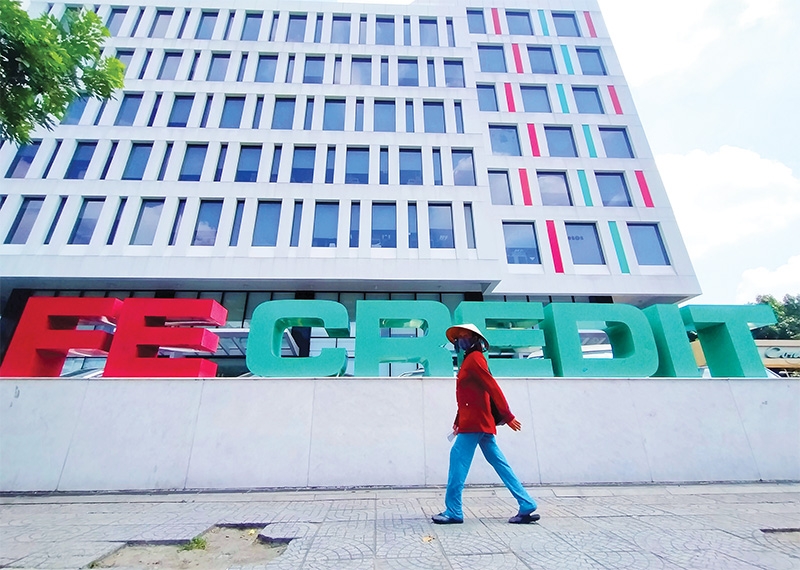Diversifying local consumer finance
 |
| For the first time in a decade, Vietnam’s consumer finance market saw a single-digit growth rate |
FE Credit, the biggest consumer finance player in Vietnam and a subsidiary of VPBank, is said to be preparing for its initial public offering (IPO) in the third quarter of 2021.
VPBank’s Board of Directors forecasts that a successful IPO could triple FE Credit’s share price compared to the book value after the equitisation, according to brokerage SSI.
Currently, the Vietnamese market boasts 16 consumer finance companies, of which six are subsidiaries of major local lenders, including HD Saison of HDBank, SHB Finance of SHB, MCredit of MB, and Post and Telecommunication Finance Co., Ltd. (PTF) of SeABank.
Of the six, only SeABank has no plans to divest its ownership. The remainder have, or will be, selling from 49-50 per cent of charter capital in their affiliated financial companies.
Earlier this year, the State Bank of Vietnam (SBV) approved increasing the charter capital of HD Saison. After the capital hike, HD Bank holds 50 per cent of the stakes in the consumer finance firm while Japanese investor Credit Saison and Ho Chi Minh City Securities Company own 49 and 1 per cent, respectively.
At the annual shareholders’ meeting in June, HD Bank revealed its ambition to convert HD Saison into a joint-stock company. This is generally seen as a move laying down the groundwork for an IPO.
Previously, MB sold 50 per cent of its capital at MCredit to Shinsei Bank from Japan, while Techcombank transferred 100 per cent of its shares at Techcom Finance to Lotte Card of South Korea, now Lotte Finance. VPBank has reportedly been negotiating with a high-profile investor in the sale of shares of FE Credit, which is expected to be completed in the next 5-6 months.
SHB Finance, the consumer finance arm of privately-held lender SHB, inked a loan agreement with Swiss management fund ResponsAbility Investment AG in July.
The agreement with the $3.5 billion investment fund giant will offer great mutual benefits, where the Swiss fund could jump on the lucrative consumer finance bandwagon in Vietnam, and SHB Finance could enhance its operations to international standards.
“We are proud of having a team rich in experience in financial solutions and a solid banking background,” Dinh Quang Huy, CEO of SHB Finance, told VIR. “With our comprehensive knowledge in the field, we believe we’re evolving in sync with the burgeoning demands of the consumer finance industry.”
Furthermore, the SBV’s Circular No.18/2019/TT-NHNN dated November 2019 on limiting unsecured consumer-finance personal loans has exerted more pressure for all players in the field.
Cash loans have become slightly more prevalent, accounting for over 67 per cent of the total loan portfolio in the first half of 2020. Companies are therefore coming up with new forms of indirect loans, diversifying their indirect loan portfolio, together with actively promoting credit cards.
Meanwhile, consumer finance firms have actively made a shift in their portfolio mix, providing more products to deliver better customer experiences. For instance, Mirae Asset Finance Vietnam is rolling out a special loan package focusing on beauty to address the demand of some for undergoing plastic surgery.
Besides that, Lotte Finance Vietnam is ramping up its credit card business, with cooperation with other partners such as Visa, Kookmin Bank, and IBK. During social distancing measures, FE Credit also saw a surge in credit card usage, especially for grocery and online shopping.
According to data provider FiinGroup, for the first time in a decade, the Vietnamese consumer finance market experienced a single-digit growth rate (9.2 per cent on-year in the first half of 2020), following aggressive credit growth over the past few years. This is attributed to the dual challenge posed by the pandemic and tightening regulations on cash loans disbursement. However, despite the modest growth rate, consumer finance maintained a contribution of over 20 per cent of the country’s loan book.
“The average net interest margin (NIM) of the sector followed a downward trend, reflecting the first half of 2020 seeing a greater and more immediate impact of COVID-19 on companies’ earning quality. Nonetheless, some companies such as HD Saison, Shinhan Finance, and Lotte Finance managed to increase their NIM thanks to low-cost capital mobilised from parent companies,” noted FiinGroup.
What the stars mean:
★ Poor ★ ★ Promising ★★★ Good ★★★★ Very good ★★★★★ Exceptional
Related Contents
Latest News
More News
- VNPAY and NAPAS deepen cooperation on digital payments (February 11, 2026 | 18:21)
- Vietnam financial markets on the rise amid tailwinds (February 11, 2026 | 11:41)
- New tax incentives to benefit startups and SMEs (February 09, 2026 | 17:27)
- VIFC launches aviation finance hub to tap regional market growth (February 06, 2026 | 13:27)
- Vietnam records solid FDI performance in January (February 05, 2026 | 17:11)
- Manufacturing growth remains solid in early 2026 (February 02, 2026 | 15:28)
- EU and Vietnam elevate relations to a comprehensive strategic partnership (January 29, 2026 | 15:22)
- Vietnam to lead trade growth in ASEAN (January 29, 2026 | 15:08)
- Japanese business outlook in Vietnam turns more optimistic (January 28, 2026 | 09:54)
- Foreign leaders extend congratulations to Party General Secretary To Lam (January 25, 2026 | 10:01)

 Tag:
Tag:




















 Mobile Version
Mobile Version